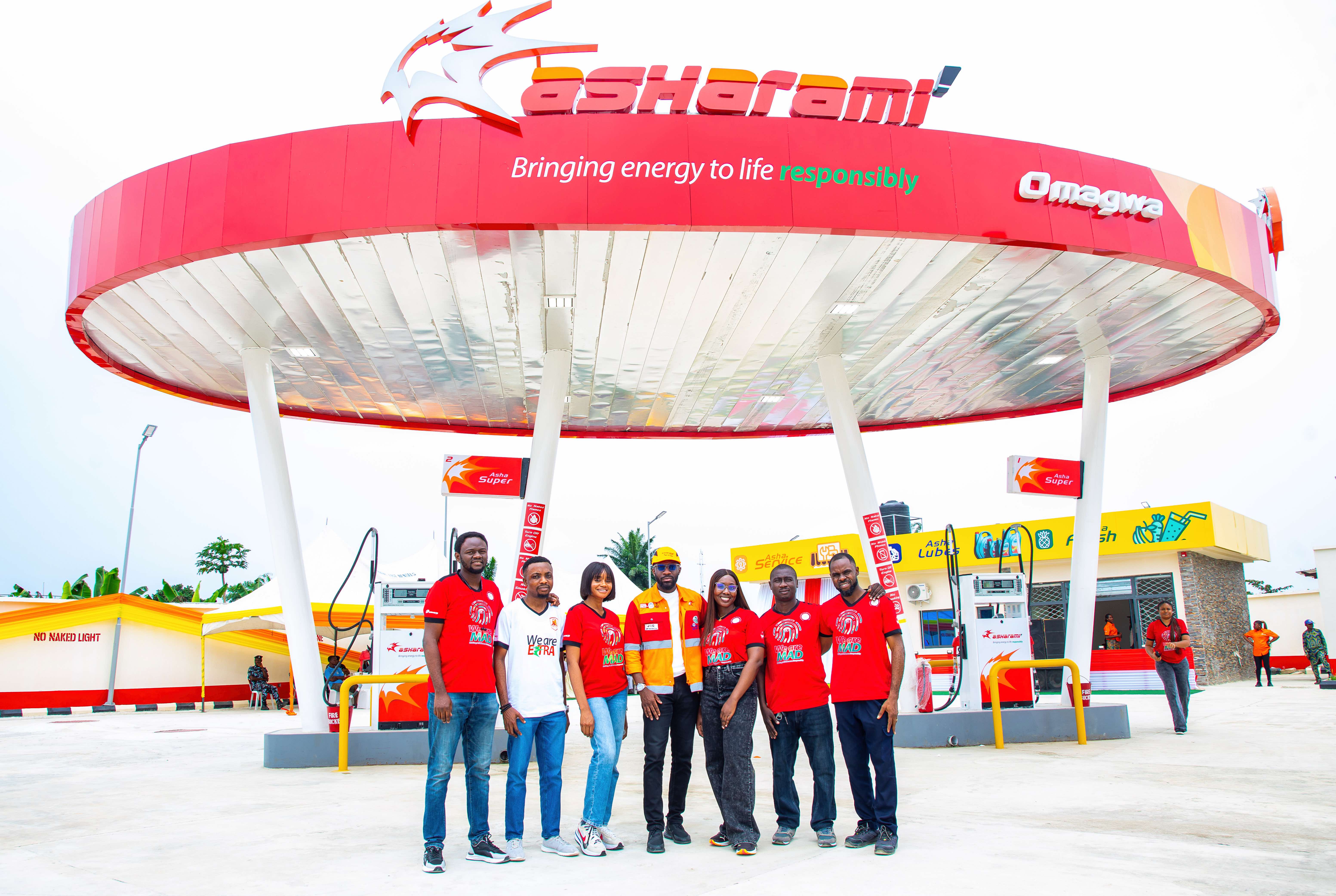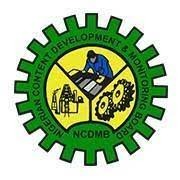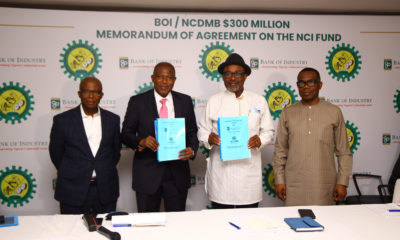Energy
NCDMB challenges service companies on employee motivation

…As Wellmann Group rewards staff with coy shares
By Yemie ADEOYE
WARRI-The Nigerian Content Development and Monitoring Board (NCDMB) has charged indigenous service companies to explore creative strategies of motivating their staff so as to retain the skills and capacities they have developed within their companies.
The Executive Secretary of NCDMB, Engr. Ernest Nwapa stated this at the long term service award organized on Saturday in Warri by Wellmann Group, an indigenous oil servicing firm with expertise in heavy lifting and marine transportation, which offered stakes in the company to four of its long serving staff as strategy of rewarding and further motivating them.
Other recipients of the awards were the company’s strategic partners and clients like Nigerdock, Shell, Chevron, Subsea7, Total among others.
Nwapa who was represented at the event by the Board’s General Manager, Monitoring and Evaluation, Engr. Chijioke Okorie explained that retaining quality staff within service companies was fundamental to developing Nigerian Content as it would help firms develop institutional, technological and infrastructural capacities to deliver on projects.
Okorie described the achievements of Wellmann as a confirmation that the Board’s implementation strategies were working and yielding results.
According to him, “There were a number of jobs that some operating companies tried to give out to international service companies. The Board intervened and the jobs were placed with Wellmann. That helped to build the company’s capacity and infrastructure over the years. Wellmann is a good representative of Nigerian Content and the Board is proud of its growth.”
In his welcome address, the Chief Executive Officer of Wellmann Group, Mr. Chris Iyovwaye explained that the benefitting employees had worked devotedly in the establishment for over 10 years and had become stakeholders of the company.
He noted that they joined when the company was barely able to pay meagre salaries, hence deserve to receive a percentage of profit declared at the end of every financial year.
Iyovwaye commended the NCDMB for its implementation of the Nigerian Content Act, crediting the policy for the growth of the company especially in an area that was dominated by foreign players.
He further stated that “Wellmann is just one of the many success stories scattered all over Nigeria, doing well because of the implementation of the Nigerian Content Act. With determination and focus, we have grown from a company that hires equipment whenever it wanted to work, to a company owns every type of equipment whenever it goes to work.”
The CEO listed some of the company’s equipment to include self-propelled modular trailers, with capacity to lift and transport over 4000tons of structures at a single lift; modular jacking and weighing systems; offshore barges; ballast and mooring equipment and cranes.
He further attributed the success of the company to the ploughing back of resources generated from the business and expressed readiness to invest further in barging and tugboat business, which according to him was still dominated by foreign companies, thus contributing to huge capital flight.
In his comments, the Managing Director of Warri Refining and Petrochemical Company Limited (WRPC), Engr. Paul Obelley extolled NCDMB for creating a climate that has encouraged Nigerians companies to thrive.
Obelley who chaired the event stated that “no matter how much Nigeria is rich in crude oil, if our people do not get involved in the service end of the industry, we would remain poor and unable to create jobs.”
According to him, the Nigerian Content Act is a good initiative for unlocking the wealth of the economy for Nigerians.
Energy
Asharami Synergy Unveils Fuelling Solutions In Omagwa

In line with its commitment to driving access to quality petroleum products, Asharami Synergy Limited, a leading Sahara Group downstream company, has said the public can now access exceptional fuelling solutions at its newly commissioned retail station in Omagwa, Rivers State.
Situated strategically along the Airport Road in Omagwa, the station, which features a storage capacity of 45,000 litres each for Automotive Gas Oil (AGO, also known as diesel) and Premium Motor Spirit (PMS, also known as petrol) is equipped with two pumps and four discharge nozzles for PMS and AGO.
The facility also has ample space for sundry services in a bid to ensure consumers get more “miles and smiles” as well as the energy to “go further” with Asharami’s world-class products.
“The Asharami Omagwa Retail Station is fully operational, offering a range of premium products and services. It’s a one-stop shop that also gives our esteemed customers eat-in and take-out restaurant services, shopping, as well as the Asha lubricants and Asha Service experience which will ensure premium care for all classes of automobiles and engines,” said Oladimeji Williams, Head, Government Relations and Business Development at Asharami Synergy.
ALSO READ: NNPCL Launches Utapate Crude Oil Blend, Eyes Production Expansion In 2025
At the Commissioning, Willaims said the new station represents an important step in Asharami Synergy’s expansion plan aimed at reaching and serving more communities responsibly. “This station is strategically positioned close to the airport, serving as the gateway for powering socio-economic development in the community and those close to it, while enabling Asharami Synergy integrate all aspects of its downstream business towards ensuring efficiency and value for our customers,” he stated.
Williams commended the Federal Airport Authority of Nigeria (FAAN) and the Omagwa community leaders for their support and collaboration throughout the project’s duration, describing it as a “seamless and productive process that highlights Asharami’s corporate stewardship and social impact” in the community.
Similarly, Ifesinachi Ezike, Regional General Manager (South South), FAAN, emphasized the broader significance of the new station, stating, “This occasion marks a significant milestone not just for Asharami Synergy but for the airport and the entire community. It marks not just an opening of a new facility but the beginning of a renewed commitment to enhancing the travel experience of all our passengers and stakeholders”.
In a move that underscores its commitment to sustainability and community development, Asharami Synergy also commissioned a solar-powered borehole during the launch. The borehole is set to improve access to clean and reliable water for residents, marking a tangible contribution to the local community.
“At Sahara, we are always making a difference—not just through our business operations; we are unwavering in our commitment to driving sustainable development and building partnerships that enhance the well-being of our host communities,” Williams added.
Energy
Awards Galore For Shell, Staff At NAPE 2024 Conference

The Shell companies in Nigeria and staff won awards in recognition of their robust participation at the 42nd Annual International Conference and Exhibition of the National Association of Petroleum Explorationists (NAPE), held in Lagos.
At the closing dinner of the event, the Managing Director of Shell Nigeria Exploration and Production Company (SNEPCo), Ronald Adams pledged sustained efforts by the company to address “the Nigerian energy trilemma by powering progress towards energy security in a sustainable manner”.
On the awards, the Shell was declared Best Overall Exhibitor and Best Exhibiting Energy company (International) just as Geophysicist Somime Oguntola took home the Award of Excellence for Oral Paper (second place).
The icing on the cake was a Shell staff, Johnbosco Uche, being installed as the new President of the NAPE.
It was gathered that the Shell companies in Nigeria have supported NAPE since its founding in 1975, using the skills and expertise of the large pool of energy professionals in its employment to improve its activities especially educational and mentoring programmes.
In addition to being a major sponsor of the 2024 conference, Shell mounted a high-profile exhibition, featuring among other things, career counselling, engagements on Nigerian Content and Contractor development and panel sessions on Women in Industry and Sustainability Energy Challenge.
A highlight was the Shell medical stand which attended to more than more than 500 conference participants and members of the public over the four days of the annual event. The doctors and nurses offered a wide range of services including laboratory tests, deworming, medical consultation as well as ophthalmology checks and distribution of nearly 300 eyeglasses.
Adams referred to the operations of SNEPCo as an example of Shell’s contribution to energy security in Nigeria. “As a result of sustained production from Bonga, we have provided funds to finance development, created a new generation of Nigerian Deepwater professionals, empowered indigenous contractors and service providers, and implemented social investments that have touched lives in the six geo-political zones of the country,” he said.
Adams added, “SNEPCo and indeed Shell are in Nigeria for the long haul. Our commitment is reflected in both our current and growth plans, all of which are grounded in principles of safety, affordability, and competitive performance.”
Energy
Accugas Denies Culpability In Akwa Ibom’s Power Outage

Owing to the persistent power outage, which has crippled economic and social life in most parts of Akwa Ibom State and environs, Accugas Limited has washed its hands off the ugly situation.
This was contained in a statement under the signature of its Communications Manager, Okwudili Onyia, in which the company traced the anomaly to a “fault in the 132-KV Aba-Itu transmission line”.
To ameliorate the situation, the company maintained that “It is imperative that the restoration of the Aba-Itu line is completed as soon as possible.”
In addition, the company pledged thus, “Accugas will continue to partner with, and support, the government of Akwa Ibom State towards achieving the government’s agenda for economic development and prosperity of the state.”
ALSO READ: NNPC Ltd To Supply 100mmscf/d Gas To Dangote Refinery
The statement reads, “Accugas Limited, a subsidiary of Savannah Energy, wishes to strongly deny the misinformation concerning its alleged involvement in the current power outage in Akwa Ibom State.
“The power cut in Akwa Ibom State is entirely due to the reported fault in the 132-KV Aba-Itu transmission line, which, unfortunately, is preventing power being transmitted from the National Grid into the State. It is imperative that the restoration of the Aba-Itu line is completed as soon as possible.
“Ibom Power Company (“IPC”) is one of 23 thermal power generation companies which channel power to the National Grid, which in turn disseminates all accumulated power to each State of the Federation through the electricity distribution companies (“Discos”). Indeed, Accugas supplies gas to enable c. 20% of Nigeria’s thermal generation capacity and, as such, is a critical enabler of the Nigerian economy.
“Within Akwa Ibom State, Accugas has been the sole supplier of gas to IPC since 2014 and, together with other Savannah subsidiaries, has invested over US$1.5 billion in gas development within the state. Furthermore, Savannah has recently invested c. US$45 million in a gas compression project at Accugas’ Uquo central processing facility at Esit Eket. Accugas’ commitments also extend to several social investment projects in the state. All the foregoing investments and projects, including other imminent investments Accugas intends to make in the State, demonstrate the Company’s long-term commitment to Akwa Ibom State and Nigeria.
“Accugas will continue to partner with, and support, the government of Akwa Ibom State towards achieving the government’s agenda for economic development and prosperity of the state.”



















